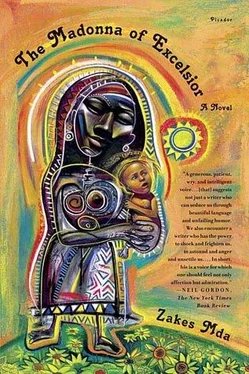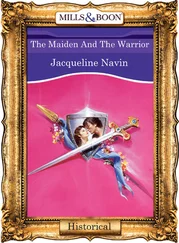Niki did not answer.
“I think we must declare a truce,” pleaded Johannes Smit. “We can’t live in the past forever. Bygones should be allowed to be bygones, Niki.”
“This is a strange way of asking for forgiveness,” said Niki. “I do not understand all this nonsense about a truce. I don’t remember any war between us. You, Johannes Smit, wronged me. You stole my girlhood. And now you talk of a truce?”
It was Johannes Smit’s turn to be silent. He held his peace until they reached the Cronje homestead.
He led the two women through the kitchen door, as was the custom. He asked them to wait on a bench while he went to look for Jacomina. Niki’s eyes ran around the room. It had not changed. The varnished oak cupboards and the cast-iron pots and pans that hung on the wall were as she remembered them. So were the wooden table and the six heavy wooden chairs in the centre of the room. The antique coal stove was still there. But it was no longer in use. There was a cream-white electric stove and a matching fridge. These were the only new additions.
Jacomina came and led the women to the bedroom, without greeting them. Tjaart Cronje was lying in the antique metal bed. Niki recognised the bed at once. She shivered slightly as she remembered lying on it. It was possible that Popi had been conceived on that bed. If not in the sunflower fields. Or in the barn. The white bed still looked like a hospital bed to her. And the fact that a gaunt Tjaart was lying in it, covered with a white sheet, enhanced its hospitalness. The atmosphere in the room reeked of a hospital.
“Niki, you came too?” said Tjaart Cronje, his eyes brightening. “You are lucky my mother is at the butchery. Otherwise you would not leave this house alive.”
Then he laughed weakly at his own joke. No one else laughed. Jacomina left the room. Johannes Smit gestured to Niki that they too should leave. But she did not move. Her eyes were fixed on the framed portrait on the wall. A dashing Stephanus Cronje, frozen in a perpetual state of youthfulness. Johannes Smit gently took Niki’s arm and led her out. Popi’s eyes remained fixed on the portrait.
“I wish you had known him, Popi,” said Tjaart Cronje in a quivering voice.
“Known him?” asked Popi.
“Our father,” responded Tjaart Cronje. “He was not a bad man.”
“ Your father.”
“Our father. Surely you know that by now.”
“I have heard whispers.”
There was an uneasy silence for a while. Then Tjaart Cronje made some small talk about their days on the council. He did not talk about their fights. He recalled only some of the funny moments when the joke had been on him. Self-deprecating moments. Soon Popi was laughing. An uneasy kind of laughter. After a while, Tjaart Cronje said he was tired and wanted to sleep. He thanked her for coming. But as she was about to walk out of the door, he called her back.
“I have a little present for you,” he said, giving her a container of Immac hair remover. “It is a cream that will make your legs smooth.”
For a moment, anger flashed across Popi’s face. Her hand did not move to take the insensitive gift from his shaking hand. But when she saw the earnestness of his face, she took it and said, “I don’t shave my legs, Tjaart.”
“You are a beautiful woman, Popi. Very beautiful. That cream is going to enhance the beauty of your long legs,” he said.
Popi smiled and whispered, “I do not shave my legs, Tjaart.”
“But you must,” cried Tjaart Cronje. “You are a lady. A beautiful lady.”
Popi was blushing all over. No one outside Niki and Viliki had ever called her beautiful before. At least, not to her face. Apparently she never knew how we used to gossip about her beauty, grudgingly praising it despite our public denunciations of her being a boesman.
“Lizette de Vries told me that progressive women don’t shave their legs,” she said. “Not even their armpits.”
“Lizette de Vries is an old-fashioned old fart,” he responded, chuckling at his own joke again.
“I’ll take the cream, Tjaart, because in my culture they say it is rude to refuse a present. But I will never use it. I love my body the way it is.”
Once more she bade Tjaart Cronje goodbye and left the room. Niki was waiting for her in the passage.
“I wonder what is eating him,” Popi whispered to Niki.
“Anger,” Niki whispered back. “It is as I told you, Popi. Anger does eat the owner.”
“He didn’t say much. I wonder why he wanted to see me?”
Johannes Smit and Jacomina were waiting for them in the kitchen.
As they walked back to Johannes Smit’s bakkie, they heard Jacomina whispering to Johannes Smit: “She looks so much like Tjaart.”
It was a season of whispers.
35. FROM THE SIJVS OF OUR MOTHERS
THE REAL NEW MILLENNIUM has dawned. Four women with pointed breasts walk in single file. Their long necks carry their multicoloured heads with studied grace. Their hair is white with age, but their faces glow with youth. They do not lose their way, even though they undertake their journey with closed eyes. They walk straight and rigidly, their brown shoes hardly leaving the naphthol crimson ground. Their profiles foreground a white and yellow sky. The woman in front wears a green dress. Her face is pink and blue and green. She holds a bunch of white cosmos. The second woman wears a red dress. Her face is blue and orange. She holds a bunch of violet cosmos. The third woman wears a brown dress. Her face is blue. She carries a bunch of pink cosmos. The fourth woman wears a green dress. Her face is brown and pink. She holds a bunch of white cosmos.
It was the time of the cosmos. And of the yellowness in the fields and the sandstone hills. Niki walked among the cosmos between the sunflower fields, collecting cow-dung in a sisal sack. She walked along the path that bordered Johannes Smit’s farm. She could see from a distance the barn that she used to know so well. Although it had fallen into disuse, its skeleton stood proudly as a monument to a breathless past. She could see with yesterday’s eyes the barn assuming the shape of a wanton temple, with female supplicants walking into it. She could hear with yesterday’s ears moans and groans escaping through its cracks and drenching the whole valley. Echoes of pain and pleasure relayed throughout the eastern Free State.
Niki was pleased that Popi had remained at home that day. Otherwise she would have had to explain the sudden change in her breathing. It had become fast and furious.
She had wanted Popi to come with her. But Popi had been very busy admiring herself in the mirror. Lately Popi spent all her mornings looking at herself in the mirror, admiring her blue eyes, and brushing her long golden-brown hair. She no longer hid it under huge turbans. She wondered why she had been ashamed of it all these years, why she had never noticed its beauty. She brushed it and combed it over and over again. It was so long that it reached behind her knees when she stood up straight.
She did not only admire her hair and her eyes. She loved her yellow-coloured face and her long neck that had the spot where the skin continued to peel off. She loved her body and everything about it. She had taken to wearing the isigqebhezana, the micro-miniskirts of the new millennium, displaying her long yellow-coloured legs that bristled with golden-yellow hair. She was no Barbie doll: she would not shave her hairy legs. Her hairy arms. Even her armpits. She rejoiced in her hair and in her hairiness.
She enjoyed her own beauty and celebrated it.
When Niki returned with the cow-dung, Popi was still admiring her beauty in the full-size mirror that she had placed against the corrugated-iron wall.
Читать дальше












